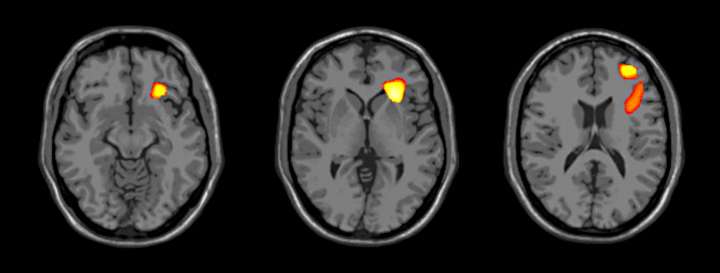The images show the brain regions (right insula and frontal cortex) where volume decreased more over approximately two years in adolescents with bipolar disorder, compared to adolescents without bipolar disorder. Credit: Blumberg lab and Biological Psychiatry
In adolescents with bipolar disorder, key areas of the brain that help regulate emotions develop differently, a new study by Yale School of Medicine researchers shows.
In brain areas that regulate emotions, adolescents with bipolar disorder lose larger-than-anticipated volumes of gray matter, or neurons, and show no increase in white matter connections, which is a hallmark of normal adolescent brain development, according to the imaging study published May 29 in the journal Biological Psychiatry.
The differences were noted in the prefrontal cortex and insula in the magnetic resonance imaging scans—repeated over a two-year period—of 37 adolescents with bipolar disorder when compared to the scans of 35 adolescents without the disorder.
"In adolescence, the brain is very plastic so the hope is that one day we can develop interventions to prevent the development of bipolar disorder," said senior author Dr. Hilary Blumberg, professor of psychiatry, diagnostic radiology, and in the Yale Child Study Center. She is also the newly appointed John and Hope Furth Professor of Psychiatric Neuroscience.
Bipolar disorder often first appears in adolescence and is marked by severe shifts in mood, energy, and activity levels. Individuals with bipolar disorder can have trouble controlling impulses and have a high risk of suicide and substance abuse.
While adolescents tend to lose gray matter in normal development, the study showed that adolescents with bipolar disorder lose more. Moreover, the study demonstrated that they add fewer white matter connections that typically characterize development well into adulthood. These changes suggest that brain circuits that regulate emotions develop differently in adolescents with bipolar disorder.
More information: "Anterior Cortical Development During Adolescence in Bipolar Disorder." DOI: dx.doi.org/10.1016/j.biopsych.2015.03.026
Journal information: Biological Psychiatry
Provided by Yale University




















